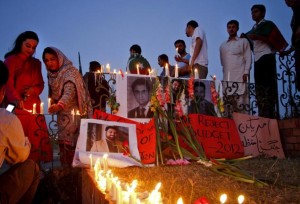Who watches the watchmen? Who guards the guards?
These sayings have been used to debate the question of where power should ultimately reside. In the world’s democracies, the power rests with the people’s ability to make informed decisions. Key reason democracies protect the freedoms of speech and press is because media has the duty to relay information and keep people up to date on current events. Journalists are tasked with the crucial role of reporting, honestly and accurately, what is happening in society.
And so what do we do when the watchmen, the guards, become the enemy? How does a nation respond when the security agencies now pose a serious threat to the safety of its people? What happens when the intelligence agencies order the murders of journalists?
Today, the New York Times has an article detailing what many in Pakistan already suspect: the ISI ordered the abduction and murder of a Pakistani civilian who was seen as a threat to their secret operations. The torture and killing of Pakistani journalist Syed Saleem Shahzad sent shockwaves throughout Pakistan, and further raised speculation about the integrity of the country’s Inter-Services Intelligence. The outpouring of public anger, from Mr. Shahzad’s fellow journalists to political pundits, demanded justice. In response, the Supreme Court has authorized a commission to investigate the killing.
We have to face the truth. We cannot ignore the fact the ISI figures largely into this case: to do so would come at the expense of our collective safety. Mr. Shahzad’s last article discussed the reach of extremists within Pakistan’s navy, and detailed their role in the attack on PNS Mehran naval station. This proved to be too much for an already humiliated ISI following the American raid killing OBL in Abbottabad, and the orders to kill him were given. Kidnappings and beatings of Pakistani journalists are not unheard of. Mr. Umar Cheema, a reporter for “The News” recounted his kidnapping and severe beatings. “I have suspicions and every journalist has suspicions that all fingers point to the ISI,” he said, referring to the Inter-Services Intelligence agency. He said that earlier this year, an ISI officer summoned him to a coffee shop in Islamabad and warned him to fall into line.
Enough is enough. Pakistan was not created so the ISI could win a popularity contest. The ISI was created to protect its citizens, not kill them. Pakistanis suffer daily at the hands of extremists, and the idea the ISI is in cahoots with them is sickening. As Mr. Cheema writes, Pakistan’s journalists are dying to tell the story. They die, informing us of the darker realities within our country, because ultimately, power rests with the people.
The people must not remain silent.
![]()






